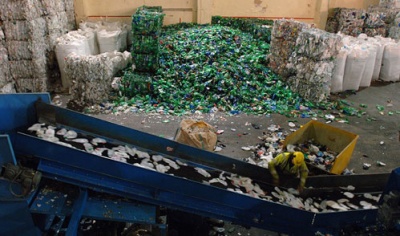Veolia fined £450k after MRF injury

Leicester Crown Court heard last week (18 December) how the 41-year-old employee, who has not been named, sustained serious head and brain injuries, including a fractured eye socket, back and skull, when a stack of waste collapsed on him at the company’s Castle Donington MRF near Derby.
The man had been sweeping up around the base of the stacks when the incident occurred in November 2013.
An investigation carried out by the Health and Safety Executive (HSE) concluded that the company did not identify the risks of inconsistent stacking and de-stacking of baled waste, or ‘the simple controls to manage it’.
Veolia ES (UK) Limited was subsequently fined a total of £450,000, with additional costs of £11,676 after pleading guilty to breaching Regulation 10(4) of the Work at Height Regulations 2005.
The regulation requires materials and objects to be stored in such a way that they do not collapse or overturn. This means ensuring that bricks, bales of paper or similar are stored safely so that they do not constitute a risk.
The Castle Donington MRF was opened in 2010 to process waste from the commercial sector. It takes around 30,000 tonnes of recyclable material from 2,500 commercial waste customers in the Derby area.
Life-changing injuries
Speaking after the hearing, HSE inspector Alison Cook said: “Veolia relied upon a flawed and inadequate generic risk assessment.
“Veolia even failed to implement the few inadequate controls they had listed. As consequence, workers were exposed over a number of years to the risk of being struck by falling bales of waste. Unfortunately for one worker, he was hit by falling bales, causing life-changing injuries that have had serious long-term effects.
“This prosecution sends a clear message to large organisations that exposing workers to foreseeable risks over a sustained period of time will not be tolerated.”
A Veolia spokesperson said: "We deeply regret this incident and the injury suffered by our colleague at our facility on Trent Lane, Castle Donington. As a company we treat health and safety as the highest operational priority. We have since reviewed all relevant safety procedures and have taken the necessary steps to ensure the highest safety standards during the stacking of bales at all of our sites."
Health and safety in the waste industry
The waste and recycling industry has been branded as one of the most dangerous to work in, and figures released by HSE in July revealed that 11 people, including six members of the public were fatally injured in the waste and resources sector in 2014/15.
This number constitutes a 120 per cent increase on the number of deaths reported in 2013/14, and the rise has largely been due to an increase in the number of members of the public being fatally injured at waste sites or by waste machinery.
In 2013, the body published the ‘Waste Industry Safety and Health (WISH) blueprint 2012-15’ to outline ‘immediate action points’ that employers can take to provide clearer training and safer workplaces.
It has also released guidance on how companies with sites accessed by both pedestrians and vehicles can ensure they are kept safe for people using the area.
Read HSE’s ‘Statistics on fatal injuries in the workplace in Great Britain 2015’.





